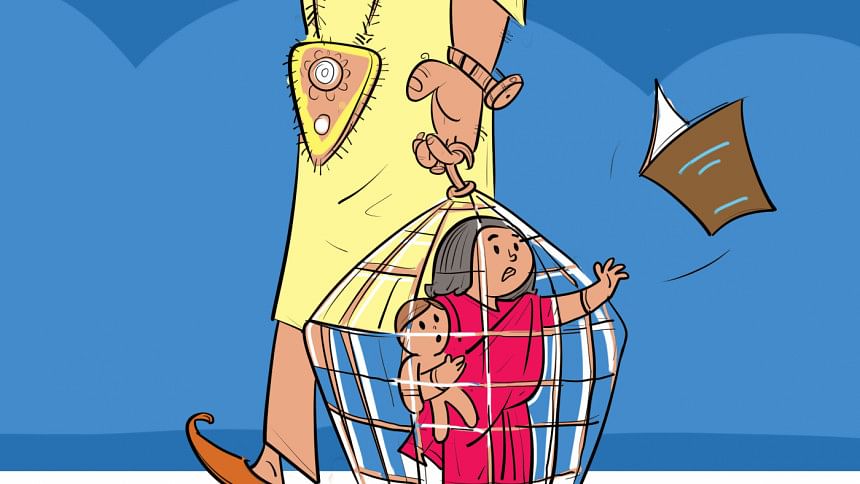Time for Bangladesh to withdraw CEDAW reservations

Bangladesh ratified the Convention on the Elimination of All Forms of Discrimination Against Women (CEDAW) in 1984, a worldwide human rights charter specifically for women. Every individual, irrespective of sex, has some inherent and unquestionable rights. However, women all around the world have been—and still are—subjected to judgement and manipulation as their rights and positions are denied, including economic, social, educational, and other fundamental freedoms. CEDAW, as a comprehensive treaty on the rights of women, establishes legally binding obligations upon state parties in order to eradicate discrimination against women for ensuring parity between men and women.
While Bangladesh has ratified CEDAW, it maintains reservations on Articles 2 and 16.1(c). Article 2 concerns the modification of social and cultural patterns to eliminate prejudices and practices that are based on the idea of inferiority or superiority of either sex. Article 16.1(c) pertains to equal rights and responsibilities in marriage and divorce, including the right to choose a spouse and enter into marriage only with free and full consent. The two articles are considered the core provisions of the convention. However, Bangladesh has reserved the right to take measures following its own laws and practices on the ground that CEDAW provisions may conflict with laws pertaining to different religious communities in the country, especially Sharia law.
t should be the top priority of the government to change such discriminatory practices and encourage open-minded behaviour towards women, without which achieving and sustaining gender equality would not be possible. To eliminate such discrimination, adoption of universal family law is recommended.
In reality, such reservations contradict international commitment to ensure equal treatment of women and the fundamental principles stated in the Bangladesh Constitution, including basic rights of citizens. For example, Article 19(3) says the state will ensure equal opportunities for women in every sphere; Article 28(1) prohibits discrimination on the ground of sex; Article 28(2) ensures equal rights of women in every sphere of the state and public life; and Article 28(4) allows the state to make special provisions in favour of women. The constitution also obliges that any law inconsistent with the fundamental rights shall be void. Despite these provisions incorporated in the constitution, Bangladesh still maintains reservations on Articles 2 and 16.1(c) of CEDAW. Meanwhile, a number of Muslim-majority countries including Türkiye, Yemen, Jordan, Lebanon, Tunisia and Kuwait have endorsed CEDAW without any reservations. Some countries have also reformed their personal laws to ensure women's rights.
In Bangladesh, the conflict between Sharia law and these reservations is not clearly addressed, leaving room for reinterpretation. For example, while Sharia law dictates that a daughter should receive half the share of inherited property compared to a son, equal distribution of property between them is not explicitly prohibited. Also, Bangladesh is not governed by Sharia law; in the absence of a uniform family code, personal and family issues are governed by different religious provisions, which have an impact on inheritance, marriage and divorce issues.
For example, Muslim marriages are regulated by Sharia law. As a result, Muslim women who face discrimination and/or abuse in marriage struggle to get justice as there is no Sharia court or legal conformity in Bangladesh to enforce their rights. In the case of Hindus, women are not permitted to get divorced, and outmoded inheritance laws still exist depriving women of their property rights, whereas in India, similar Hindu laws have already been revised.
Misunderstandings regarding religion, stereotypical beliefs, limited education, women's dependence on men, and socioeconomic structures are some of the factors contributing to this issue. It should be the top priority of the government to change such discriminatory practices and encourage open-minded behaviour towards women, without which achieving and sustaining gender equality would not be possible. To eliminate such discrimination, adoption of universal family law is recommended.
It has been observed that in the past, various religious laws have been interpreted and accepted considering the welfare and interest of the people and civilisation. Effective dialogues between the government and religious organisations to achieve consensus on this matter would be essential in this regard. Moreover, Bangladesh may follow the lead of other Muslim-majority countries and, if necessary, collaborate to ratify CEDAW without any reservations, which might boost international relations as well. Upon this consideration, withdrawal of reservations and proper implementation of CEDAW will be effective in providing a congenial atmosphere through appropriate legislative and administrative restructuring. The government can collaborate with NGOs, civil society organisations, and society as a whole to this end.
Roksana Khan is additional director at Bangladesh Institute of Governance and Management (BIGM).
Views expressed in this article are the author's own.
Follow The Daily Star Opinion on Facebook for the latest opinions, commentaries and analyses by experts and professionals. To contribute your article or letter to The Daily Star Opinion, see our guidelines for submission.

 For all latest news, follow The Daily Star's Google News channel.
For all latest news, follow The Daily Star's Google News channel. 










Comments